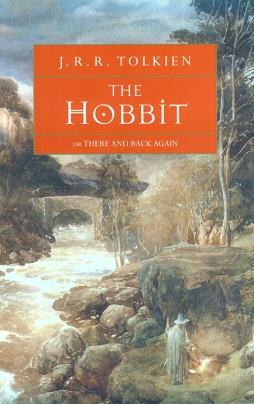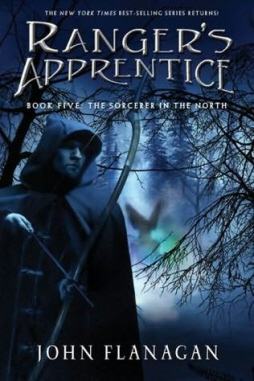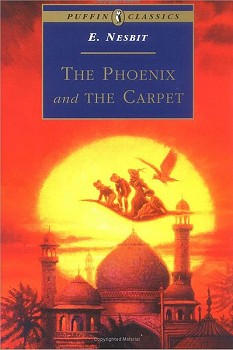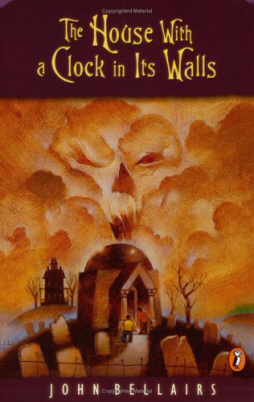Fantasy Out Loud
 Nearly every night, I read aloud to my boys. For Evan, my seven-year-old, I have lately been reading The Hobbit. Two nights ago, no sooner had I begun than Evan interrupted, saying, “It’s funny how they spell ‘Smaug.’”
Nearly every night, I read aloud to my boys. For Evan, my seven-year-old, I have lately been reading The Hobbit. Two nights ago, no sooner had I begun than Evan interrupted, saying, “It’s funny how they spell ‘Smaug.’”
“Oh?” I asked. “How would you spell it?”
“S-M-O-G.”
“Good,” I said. “That is how you would normally spell it.” But privately, I thought how wonderful it was that Tolkien chose this other, more evocative spelling. It also occurred to me that without Evan’s commentary, I might not have even noticed.
What we choose to read to our children has ramifications almost beyond counting. Certainly, a shared reading experience is pivotal to the in-home dynamics and shared knowledge of any family, but insofar as one tackles a diet of writing that qualifies as “fantastic,” reading aloud is also crucial to the development and enculturation of an entire new generation of fantasy readers. Given a world that grows ever more hectic, and therefore has less and less time for “pleasure” reading, this is no small thing.
I am fortunate to have two children, both boys, and I can see the results of my reading choices –– the goblin fruit, as it were, of my labor –– as if I had scrawled on their souls with indelible ink. Corey, my older boy, now reads nothing but fantasy fiction, at least not by choice. (He has also, to my dismay, discovered comics, and for this, too, I blame myself.)
At eleven, he has blazed a trail through the Eragon books, The Golden Compass trilogy, a good many early-seventies Target-published Doctor Who novelizations, and as many Redwall books as he can dig from the library’s stacks.
 His latest addiction is John Flanagan’s Ranger’s Apprentice series (an outing that seems to this jaded reader to be both highly derivative and downright endless).
His latest addiction is John Flanagan’s Ranger’s Apprentice series (an outing that seems to this jaded reader to be both highly derivative and downright endless).
Evan, at seven, tackles less ambitious fantasias: Calvin & Hobbes, in which children are always poorly behaved but possess sufficient imagination to light up the sky, and The Box Car Children, in which children are always perfectly behaved but have no more imagination than Wonder Bread.
More instructive is what Evan wants his parents to read to him: Lloyd Alexander (all of it) and, from me, The Hobbit. Evan heard the first chapters of The Hobbit read aloud to big brother Corey over a year ago, on a camping trip. To my surprise, those overheard snippets seared themselves into his memory.
So in the end, it was not my choice to begin The Hobbit, a surprisingly tough book for a seven-year-old (especially after Mirkwood, as Tolkien moves the book swiftly from comic adventure into a meditation on war, greed and generosity). The decision was entirely Evan’s.
Some of the words are foreign to him, of course. Occasionally, I pause for explanation. At other moments, I soldier on, confident that the storytelling is strong enough to impart its own meaning. (Do you, gentle reader, do the same for your young ones?)
Either way, Evan has certainly followed the tale. Sometimes he picks up on things I had not caught. For example, as Bilbo sat pondering the hidden door of the Lonely Mountain, Evan suddenly said, “Daddy, did you notice that Bilbo doesn’t think so much about his hobbit hole any more? He thought about it a lot at first, but not so much after the goblins.”
 I hadn’t noticed that. I’m actually not sure it’s true. But it’s a keen observation, nonetheless, and one that had nothing to with the passage I was then reading. Umberto Eco is right: we read (and receive reading) on a plethora of levels, all in concert.
I hadn’t noticed that. I’m actually not sure it’s true. But it’s a keen observation, nonetheless, and one that had nothing to with the passage I was then reading. Umberto Eco is right: we read (and receive reading) on a plethora of levels, all in concert.
How did I settle on The Hobbit in the first place, for Corey? For one reason: it was a part of my childhood, a part that I wished to share: to impart.
Isn’t that always the explanation for why we put certain works in the path of our children? To relive the best of what we ourselves cut our teeth on?
On a more self-absorbed level, by providing stories I already know and love, I am able to reacquaint myself with texts that are, in some cases, so dusty within the vaults of memory that I no longer carry much more than impressions. An image here, a plot point there. A snippet of conversation; a hint of how or where I was way back when.
I might even argue that reading a known work aloud amounts to a specific kind of time-travel –– one blessedly free of Morlocks, too, unless I choose to crack that particular cover.
The years fall away. I am once again twelve, lying half beneath the covers and glued to the pages of, say, The Phoenix and the Carpet.
 Here’s a smattering of what I have dragged back into the light for the sake of my kids (and, selfishly, myself): Rinkitink In Oz, Five Children and It, The Sword in the Stone, Awkward Magic, Pirates Of the Deep Green Sea (unjustly forgotten!), The Martian Chronicles, Alfred Hitchcock’s Ghostly Gallery (but not the just-too-creepy classic, “The Upper Berth”), “The Reluctant Dragon,” The Silver Crown, The Pool of Fire (and the rest of John Christopher’s excellent Tripods Trilogy), A Wrinkle in Time, The Story of Doctor Doolittle, The House With a Clock In Its Walls, “Jimmy Takes Vanishing Lessons,” The Phantom Tollbooth, Alice Through the Looking-Glass, plus any number of fairy tales, both Grimm and otherwise.
Here’s a smattering of what I have dragged back into the light for the sake of my kids (and, selfishly, myself): Rinkitink In Oz, Five Children and It, The Sword in the Stone, Awkward Magic, Pirates Of the Deep Green Sea (unjustly forgotten!), The Martian Chronicles, Alfred Hitchcock’s Ghostly Gallery (but not the just-too-creepy classic, “The Upper Berth”), “The Reluctant Dragon,” The Silver Crown, The Pool of Fire (and the rest of John Christopher’s excellent Tripods Trilogy), A Wrinkle in Time, The Story of Doctor Doolittle, The House With a Clock In Its Walls, “Jimmy Takes Vanishing Lessons,” The Phantom Tollbooth, Alice Through the Looking-Glass, plus any number of fairy tales, both Grimm and otherwise.
On the list for Corey next, since he hasn’t stumbled onto them on his own: The Adventures of Robin Hood. The poor kid has no clue who Friar Tuck is, much less Midge the Miller’s Son. Appalling. Or, in the syntax of that inveterate fantasist, Beatrix Potter, “I am affronted!”
The categories that I will not read aloud amount to four: books I deem too mature in their treatment of sex or too gruesome in their take on human relations (read: war, rape, etc.); books I found sort of dull on my own (read: the Tarzan series); books that might give my kids actual nightmares (see “The Upper Berth,” above); and books I believe they must experience for themselves.
With this last dictum in mind, I have not read to Corey (much less Evan) Susan Cooper’s The Dark Is Rising, Tolkien’s The Lord Of the Rings or the remainder of The Once and Future King.
A fifth category reared its head when revisiting the now-dated Martian Chronicles, a sub-set that I might loosely describe as titles that are downright embarrassing in their treatment of non-white characters or, sometimes, women.
 E. Nesbit makes some blunders, certainly, but the prime offender is H. Rider Haggard, who reveled in the qualities of “the noble savage” while taking great delight in slaughtering by the hundred any African who didn’t have the sense to befriend Allan Quatermain and company.
E. Nesbit makes some blunders, certainly, but the prime offender is H. Rider Haggard, who reveled in the qualities of “the noble savage” while taking great delight in slaughtering by the hundred any African who didn’t have the sense to befriend Allan Quatermain and company.
And what to make of She, in which an entire land of “primitives” winds up worshipping Ayesha (“She Who Must Be Obeyed”), the only white woman for two thousand miles?
I would do nothing to prevent my children from reading these works –– Haggard wrote cracking good adventure yarns, that much is sure –– but need I be the one to introduce them? No.
In any event, and all too soon, Corey will no longer want me to read aloud. After that, the best I’ll be able to manage will be suggestions, recommendations and vague hopes. He’ll find his own list of winners, of course; some might even be congruent with mine. Time will tell.
Until then, I can revel in The Hobbit, and in Evan’s cheerful, sometimes bracing reactions. We’re near the end, now. The dwarves have barricaded themselves into the mountain and are being downright rude to Bard. I asked Evan after this sequence if he thought there would be a war. His response? “I hope so. Because war means action and action means awesomeness!”
‘Til next time.
Dream hard.
Write harder.
Mark Rigney is the author of Deaf Side Story: Deaf Sharks, Hearing Jets, and a Classic American Musical (Gallaudet University Press), as well as the play Acts Of God (Playscripts, Inc.). Besides additional blogging for Black Gate, recent short fiction appears in the Feb. 2011 issue of Realms Of Fantasy, and a brand new tale is set to appear in the Dec. 2011 issue of Black Static. His website is www.markrigney.net.
I’ve been through someting similar with my 8-year-old, and reached the same conclusions. E.g. he’ll have to discover EE Doc Smith for himself, though I have read selected Conan to him.
I’m still enjoying reading Ranger’s Apprentice, but my god I’m glad to see the back of Beast Quest. Three books in, “Kurtzhau” noticed that he never ever USES the sword, and nobody gets KIA, and that was that. Resounding bounce.
The Rosemary Sutcliff retelling of Beowulf has to be one of the most awesome books I’ve had the priviledge to read to him, second only to The Hobbit.
Possibly the most obscure was King Harald’s saga – yes, the original in translation – which he loved.
I find myself wishing people like Howard Jones would knock out some old fashioned “boys adventure”.
I’m going to bookmark this post because it has so many great suggestions.
Two more authors to add to the list, both of which rocked my socks as a kid and which I have (or will) read to my own: the fantasies of Alan Garner (specifically the Alderley books); and John Gordon’s phenomenal The Giant Under the Snow (which, as it takes place in December, I recommend immediately!).
I’m just finishing A Princess of Mars with them and considering The Borribles next, so there’s yet another suggestion.
Wow! Ignorant me, I don’t know any of the books that J. Kuhl just named. I must get me hence to a library…thank you!
Tediously pedantic geeknote: In Tolkein’s linguistic structures, the “au” of Smaug should be pronounced more like the “ow” sound of “howl” than the “au” sound of “haul” (hence “Sow-ron” rather than “Soar-on”, as handled correctly in the LotR movies).
As regards the pronunciation of the “au” in Smaug, you are (of course) correct. However, when I first encountered Tolkien, I knew nothing of his linguistic system, and so I, like millions of others, invented my own. Having chosen “Soar-on” as the most threatening name possible, I had to go with “Smog” as the logical choice for Bilbo’s dragon. Note the discrepancy: I met Sauron first. Why? Because I read LOTR first, then went backward to THE HOBBIT, which, given its significantly lower level of ambition, I then found disappointing. It struck me then, as it still does today, as the work in which Tolkien found his wings and, even as an adult, “grew up.” This seems even more apparent when reading the work aloud. Which reminds me that when I have students before me, writing students (which I occasionally do), on one thing I insist: all great writing is meant to be read aloud. It is the ultimate method by which to experience it.
And what to make of She, in which an entire land of “primitives” winds up worshipping Ayesha (“She Who Must Be Obeyed”), the only white woman for two thousand miles?
It’s a tough call. Perhaps someone could inform us whether women trump primitives or if it is presently the other way around in the progressive calculus.
She actually sounds rather like a precursor of the later Anita Blake novels.
Mark,
If there’s anyone ignorant here, it’s me because I’ve never heard of a number of the books you mention. I’m definitely going to check out The House With a Clock in Its Walls.
Thanks for writing such a great post.
As an aside: I would be interested to know how your boys would have divided Smaug’s hoard prior to the siege. We had a discussion about it at that point in the story. We decided the dwarves should have split it with the men since they were investors but screw the elves.
This is a great post. I’m curious to see what your son thinks about the rest of the book.
I bought a copy of The Hobbit for my friends daughter she’s 10 (but has been tested to read at a high school graduate level). She stopped reading it about half way through. She said she liked it but i think tolkien’s winding writing style fell flat on her.
Well now, to answer at least one question: What do my boys think of the end of The Hobbit? We’re still not quite there, but I rolled Evan through the Battle of the Five Armies tonight, and afterward, with Bilbo back on his feet, Evan did not understand that Thorin had died. Tolkien never actually says he does, at least not in seven-year-old language. Nor do Fili and Kili, who have merely “fallen” and possibly need no more repair than a Band-aid for skinned knees.
Meanwhile, an uncle of mine who doesn’t much like fantasy read this post. A couple of choice lines of his from his email reply:
“Were you a fan of Conan Doyle’s Professor Challenger stories? Another favorite of mine.
I’m quite willing to believe in talking rabbits and demonic rats, as long as there’s a Mr. McGregor in the wings with whom I can identify.
No wonder Dubliners seems so pedestrian! If only a dragon would swoop down and snatch Gabriel out of his reverie at the end of The Dead. Now that would liven things up.”
What more can possibly be said???
: )
I would have liked to have nit-picked about the pronunciation, too, except that of course when I first encountered Tolkien’s books as a kid, I said /smɒɡ/ and /sɔːɹ.ɒn/ as well. Hey, I can admit it! 😉
I have so much to look forward to! My boys are four and one now. We’ve improvised a five minute version of The Lion, the Witch, and the Wardrobe for the older one, and read Prince Caspian serially to the younger one while he was in utero. (It amused us, and probably did no harm.)
They’re already proper geeks. My four year old recently declared, “I am from Earth, and here is my passport.”
I do hope that everyone reading and posting here will take a moment to look over the following article, brand new in this week’s NEW YORKER (link below). A great deal of unsupported opinion lurks beneath the clever, seamless writing, but the article itself makes for essential reading, as it covers what hooks readers into grand mythologies such as Tolkien’s, Paolini’s, and, yes, Ms. Twilight Meyers’.
http://www.newyorker.com/arts/critics/atlarge/2011/12/05/111205crat_atlarge_gopnik
Oh, and Sarah: Love that four-year-old self-assessment. We keep a quote book at our house, and that one would surely be included, if only one of our own had said it. : )
Awesome article Mark – thanks!
Heaven forbid the poor boys should be exposed to “embarrassing” treatments of non-whites and women. Everyone knows that today’s progressive sensibility is the only proper style of thought.
“Curiouser and curiouser!” exclaimed Alice. (I suppose I’ll be Alice, for the moment.) Twice in these comments I have been labeled “progressive.” I don’t think I have ever thought of myself as that, but no matter. I shall take it as a compliment. Does this mean I also have an agenda? Oh, dear. I guess I’ll have to go find one.
More to the point, both commentators bring up an important point that I did not really do justice to in the original piece, that being what level of protection is owed to young readers, or to children in general. Every parent will settle on a different answer, but I would err on the side of letting children have their childhood, and using their own questions and development be a reasonable guide for when to introduce (i.e., to throw into their path) more “adult” material. To shelter children for shelter’s own sake––for the “innocence” of children––is no use, first because it won’t work and second because it will surely stunt their thinking. Besides, to forever draw the curtain across the nastiness and brutality of the adult world is condescending.
Thus the question is really one of “when,” and not “whether.” My children, in part through fantasy reading, will encounter all sorts of styles of thought, “proper” and otherwise. And this is as it should be.
That New Yorker piece is a great find. It looks like Adam Gopnik is a non-geek, but a non-geek who actually gets it, which is a rare perspective. And as an outsider to the genre, he can afford to be gentle with hacks like Paolini and Meyer long enough to figure out what makes them legitimately appealing to their readers. (Certainly, he’s gentler with Paolini and Meyer than I would be–I’d rather reread “The Eye of Argon.”)
It is always amusing that progressives, who pride themselves on being smart, independent thinkers, are unable to recognize that they are utterly in thrall to ideological dogma.
But anyway, the idea that you cannot and should not shield children from the vileness of popular culture is absurd. Yes, it will work — surely you have noticed that children like yours, who read and are read to, are less stupid and vulgar than those who watch TV all the time? No, it certainly does NOT “stunt the thinking” of children to be sheltered from vile TV shows and music — in fact, it contributes to their ability to think. As for “condescending”, one “condescends” to children in a lot of ways; you tell them what is good for them because you are the adult and because their judgment is less mature than yours. This is as it should be.
I pity your children if they are exposed to adult nastiness and brutality merely because you don’t want to condescend to them. Do you let your 7-year-old run around the neighborhood after midnight because it’s condescending to tell him to come inside and go to bed at a reasonable hour?
Sarah: Gopnik’s perspective does seem rare in that it comes from outside the usual venues. I do worry, though, that he falls into the “New Yorker trap,” where the writer’s own views start sounding like Holy Writ delivered from on high. It’s not as if this is scholarly, researched material, after all. My favorite example is where Gopnik declares that readers, especially young readers, don’t identify with Sherlock Holmes (but do identify with Luke Skywalker). Seriously?
But it remains a good read, definitely, and food for thought. So glad you enjoyed the link!
: )
And for others: Evan and I have reached the end of THE HOBBIT. Evan’s chief reaction seemed to be that he was glad that Bilbo survived. He had begun to think that maybe he would not. Given his kindergarten love of MAGIC TREE HOUSE books, that’s a big step forward. Risk in fiction = potential death of well-loved protagonist.
[…] Gate contributor Mark Rigney’s story, “The Demon Laplace,” inspires the cover art by Rik Rawling for the December […]
[…] Gate contributor Mark Rigney’s story, “The Demon Laplace,” inspires the cover art by Rik Rawling for the December […]
[…] the original 2011 edition of Fantasy Out Loud, I took a stab at reviewing the fantasy books I had read aloud to my children. Back in those […]
[…] in 2011, I penned the first in this occasional series with an attempt at rating and relating the fantasy titles I’ve read […]
[…] “People and Place” reference in the back. If that scares you, go back to reading E. Nesbit and the Ranger’s Apprentice books. […]